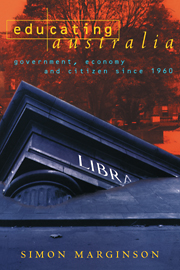Book contents
- Frontmatter
- Contents
- List of Tables
- List of Acronyms
- Preface
- 1 Introduction
- Part I The Modern Citizen 1960–1975
- Part II The Anti-citizen 1975–1990
- 4 The New Right and public policy
- 5 Individual and government
- 6 The New Right and education
- Part III The Economic Citizen 1985–1995
- Part IV The Multi-citizen 1990–
- References
- Index
5 - Individual and government
Published online by Cambridge University Press: 05 June 2012
- Frontmatter
- Contents
- List of Tables
- List of Acronyms
- Preface
- 1 Introduction
- Part I The Modern Citizen 1960–1975
- Part II The Anti-citizen 1975–1990
- 4 The New Right and public policy
- 5 Individual and government
- 6 The New Right and education
- Part III The Economic Citizen 1985–1995
- Part IV The Multi-citizen 1990–
- References
- Index
Summary
‘Underlying most arguments against the free market is a lack of belief in freedom itself. The existence of a free market does not of course eliminate the need for government. On the contrary, government is essential both as a forum for determining the ‘rules of the game’ and as an umpire to interpret and enforce the rules decided on. What the market does is reduce greatly the range of issues that must be decided through political means, and thereby to minimise the extent to which government need participate.’
Milton Friedman, Capitalism and freedom, University of Chicago Press, Chicago 1962, p. 15.Prelude: A small cloud on the horizon (1968)
In 1968 real GDP in the OECD region was increasing at 6.3 per cent per annum, unemployment was 3 per cent and inflation was 3.9 per cent (OECD 1985): after two decades of boom conditions, economic growth was more or less taken for granted, and there was little sign of the problems to come. The late Keynesian consensus continued, on both sides of politics. Yet it was a troubling time for conservatives, the year of near revolution in Paris; the peak of the peace demonstrations and the radical student movement in the United States; President Lyndon Johnson's sudden decision not to seek re-election and to negotiate a ceasefire in Vietnam; the assassination of Martin Luther King, and. the riots in Watts and other American cities. The ‘sexual revolution’ proceeded apace. The counter-culture was at its height.
- Type
- Chapter
- Information
- Educating AustraliaGovernment, Economy and Citizen since 1960, pp. 100 - 118Publisher: Cambridge University PressPrint publication year: 1997



